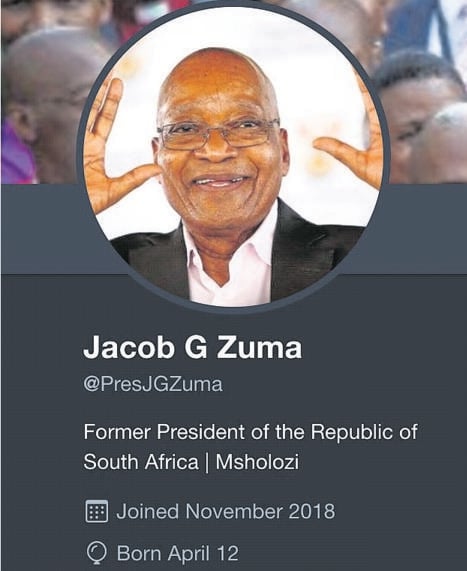
He’s doing the right thing, but he’s doing it very badly. Donald Trump’s use of Twitter to communicate directly and in real time with his voters and the world is a stroke of genius.
Trump’s posts are followed by 57 million people. He uses it to by-pass the mainstream media and to influence policy and attitudes. It creates the impression that he’s an accessable leader. His only mistake (besides his personality) is that he does it himself and doesn’t have someone vetting his messages and the language he uses.
Former president Jacob Zuma is following Trump’s lead, but he clearly does make use of advisers to shape his Twitter posts. In just a few weeks, he has accumulated 142 000 followers.
Just this week he tweeted a video of himself complaining that he has to pay his own legal costs while apartheid perpetrators “who killed my comrades” were assisted by the state. It’s nonsense, of course, but very effective, I would say.
President Cyril Ramaphosa has 379 000 followers, but his timeline suggests that it’s his office or his PR department running it rather than himself. He might as well not be on Twitter.
DA leader Mmusi Maimane (1,05 million followers) does it a lot better with more of a personal touch but he tends to be very bland. EFF leader Julius Malema (2,27 million followers) does it better with constant comment on events and party affairs and regular hissy fits and threats.
There is no reason to believe that South Africa can escape the trend in the Americas, Europe and some Asian countries where social media has a profound impact on political attitudes and election results.
And yet only the EFF is properly geared to use social media fully in its election campaign. Judging from my own Twitter timeline, virtually every EFF supporter is on Twitter.
Like an army of killer ants they attack, insult, curse and threaten in their thousands whenever anyone dares to criticise the EFF or one of its leaders. I must have blocked at least two thousand of them in recent months calling me a racist, white supremacist or worse and/or threatening me with violent retribution.
Most of these EFF tweeters have very few of their own followers. They share the same memes and send and resend the EFF’s badge with the words “Oksalayo so votela EFF” en masse.
Among them are a few leaders of the EFF’s “Twitter ground forces” who are prone to tweeting fake news items or twisting events to suit the EFF’s purposes. These tweets are endlessly retweeted by the EFF faithful.
In that sense, the EFF’s Twitter army is not much different from the Gupta bots that had infested Twitter last year with made-up stories and ad hominem attacks. Some of the former Zuma state capture legion are still very active on social media fighting against the Ramaphosa faction of the ANC.
I’m not suggesting the EFF is a good example of how political parties should use social media, but I do think the ANC and DA are slipping up by not organising a counter force to the EFF twitter army.
The nature of social media is more favourable to the EFF’s cheap and reckless populism, so the DA and ANC are at a slight disadvantage. But these parties don’t seem to have a proper social media strategy at all.
Some DA MP’s do their party a huge disfavour with their tone-deaf tweets, reactionary statements and attacks on critics, while many of its supporters who identify themselves as DA-aligned regularly come over as AfriForum types.
Helen Zille (1,36 million followers) is strong on Twitter, but the shadow of her badly phrased tweets on the legacy of colonialism still hangs over her and she is constantly reminded of them when she tweets. She can also do with a second opinion before her tweets get sent.
The more raucus and reckless social media becomes as we near next year’s election, the more important the mainstream media’s role in fact-checking and contextualising will become.
Disclaimer: News24 encourages freedom of speech and the expression of diverse views. The views of columnists published on News24 are therefore their own and do not necessarily represent the views of News24.




 Publications
Publications
 Partners
Partners























